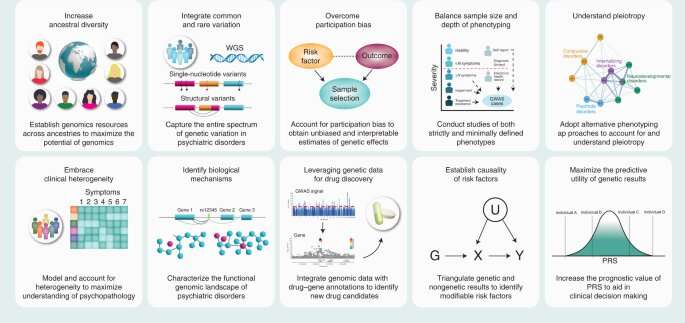Call to convert mental health genetic discoveries into better treatments for patients

QIMR Berghofer scientists are challenging the research and funding community to develop better treatments for debilitating mental health conditions by tapping the many extraordinary genetic discoveries made over the last decade to deliver a new era of precision psychiatry.
Scientists have discovered hundreds, and in some cases, thousands of genes linked to the full range of mental health conditions, including anxiety, depression, anorexia nervosa, schizophrenia, bipolar disorder, autism spectrum disorder, and ADHD. This has been made possible thanks to new genetic data sets of DNA donated by millions of people, and advancements in supercomputing technology.
The head of QIMR Berghofer's Translational Neurogenomics Laboratory, Professor Eske Derks, said it is now time to progress this research to the next stage.
She has co-led a new study, published in Nature Genetics, identifying 10 key challenges that need to be overcome before these genetic discoveries will lead to improved care of patients in the clinic.
"We've had an era of genetic discovery and now we're on the threshold of a new era of precision psychiatry which could offer more effective drugs for patients, and could help clinicians to better diagnose and treat these complex conditions.
"The challenges we've identified are not simple to solve but with a creative, collaborative, and coordinated research approach, and investment that supports scientists to do this work, we could make this new era a reality. We owe it to the people who have generously donated their DNA and to those living with a mental illness," Professor Derks said.
Two in five Australians have experienced mental illness at some point in their life. Anxiety and depression are the most common, with the COVID-19 pandemic triggering a 25% increase in cases according to the World Health Organization (WHO). Mental illnesses can significantly impact patients' quality of life, and cost the Australian economy around $70 billion every year.
Dr. Zachary Gerring, who co-led the study, said there is a tremendous opportunity to use genetic data to find more effective treatments.
"For decades, there has been little progress in developing new drugs for mental health conditions. It can be a long process of trial and error for patients to find a treatment.
"We can integrate the genetic data with drug databases to identify potential new drug candidates that can be repurposed to treat mental health conditions. Repurposing approved drugs means we could get them to patients more quickly and cheaply than developing a completely new drug," Dr. Gerring said.
QIMR Berghofer Ph.D. candidate and co-lead author, Jackson Thorp, said there is huge potential to use genetic discoveries to work out the biological mechanisms of mental illnesses.
"Our studies show there is a large genetic component which points to an underlying biological basis. Mental health conditions are diseases with a biological foundation, just like other diseases such as diabetes," Mr. Thorp said.
"By better understanding the biological processes, we could find the causes of mental health diseases which could lead to identification of high risk groups of people, more tailored interventions, and more accurate tools for diagnosis.
"I'm extremely hopeful that we can use this genetic information to improve the lives of people living with mental illness, but we really need funding to do this work," Mr. Thorp said.
More information: Eske M. Derks et al, Ten challenges for clinical translation in psychiatric genetics, Nature Genetics (2022). DOI: 10.1038/s41588-022-01174-0

















